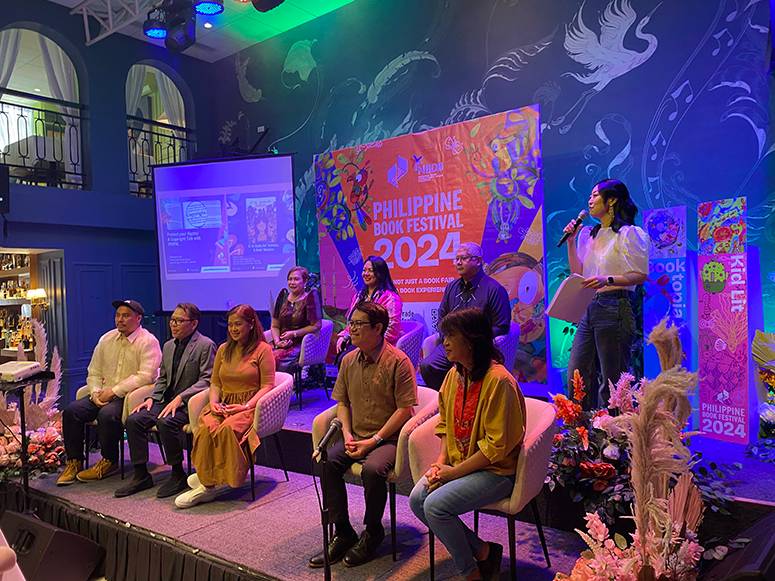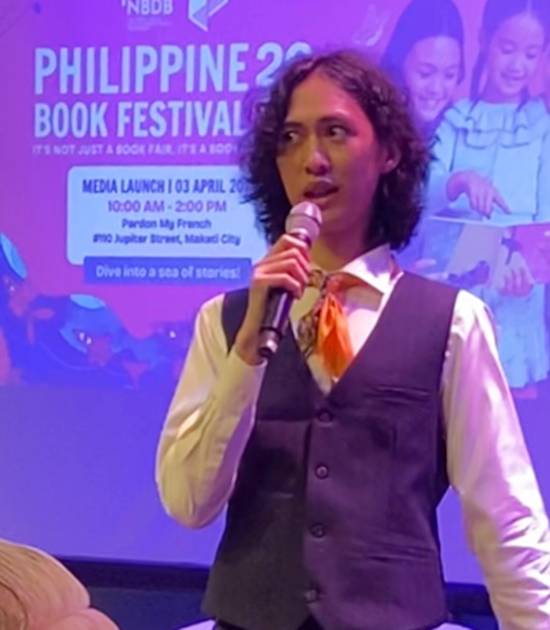Philippine Book Festival returns for ‘big celebration’ of local literature
The Philippines is a paradox. It’s a place where most people seem to respect the written word a great deal; yet it’s also one of the most online countries in the world, with TikTok and IG battling for eyeballs and attention spans every second.
So what will make the next generation of Filipinos want to become readers? And the next? And the next?
These are vexing questions, problems the publishing industry faces with surveys showing only 42 percent of Filipinos having read a single book last year.
So what will spark love of reading in future generations?

The second edition of Philippine Book Festival (PBF), set for April 25 to 28 at the World Trade Center in Pasay, is one effort to steer the public to local book experiences that are interactive (it’s one of the few places you get to meet local authors in the flesh) while celebrating the very existence of Filipino literature.
What’s new for this edition? Expect a much bigger event, with 160 exhibitors from all over Luzon, Visayas and Mindanao, with over 100 events, workshops, talks, exhibits and performances.
The four realms of the PBF will also be back: Kid Lit, an area “just for children”; Komiks, which puts the spotlight on Pinoy komiks; Booktopia, home of fiction and non-fiction titles; and Aral Aklat, devoted to textbooks and educational materials. There will be a Creators Lab, a Main Stage, and Kids-at-Play with exciting talks, activities and workshops focused on readers and fans of those genres.

Also meet and greet bestselling author Gwy Saludes (The Rain in España, Zedvage Assault); historian and bestselling author Ambeth Ocampo will hold a talk and book-signing session as well; National Artist for Film and Broadcast Arts Ricky Lee will present “Trip to Quiapo,” a talk on his scriptwriting practice and writing life.
PBF brings back the Rare Book Collection by the National Library of the Philippines, with a new and bigger selection of rare manuscripts and facsimiles curated with the NLP; plus the Book Bar, a library of award-winning Philippine-authored books; Cosplay Filipiniana, a competition where fans can portray their favorite Philippine literary characters; and Guhit Pambata, an exhibit highlighting the creations of some of our best children’s book illustrators.

At a media launch held in Pardon My French, National Book Development Board chairman Dante Ang II called the PBF “one of the NBDB’s flagship programs,” because it not only gives “access to quality Philippine books while simultaneously bringing in revenue for publishing professionals,” but seeks to address the “imbalance” in the import-to-export book ratio in schools and bookstores.
This is an ongoing effort, as NBDB executive director Charisse Aquino-Tugade learned when it started working closely with DepEd’s Bureau of Learning Resources. “We found that the majority of the recommended reading materials for schools were foreign. Our kids, besides lacking ready access to quality books, were not reading their own stories in their languages,” she said. “Visit our mainstream bookstores today, and you will see how we have relegated ourselves to a tiny Filipiniana section in the corner.” The imbalance of imported to local books on the market? Twenty-four to one.
After urging the Department of Education, Charisse says “We got 750 DepEd evaluators—up from 500—to do regional evaluations of books for purchasing for schools.” This means more local authors—and voices—represented and taught in schools nationwide.
Events like Philippine Book Festival—and the upcoming Frankfurt Book Fair, which the Philippines is set to host in 2025, and which Ang calls “the Olympics of book fairs,” providing more platforms for local authors seeking book deals and publishers—are the pathways to preserving a love of reading and publishing. And preserving literature itself.
“If we don’t provide a platform for our children to learn about themselves and the world they live in, they will grow up in environments shaped solely by other voices,” Charisse said, raising a clarion call: “Philippine books and Philippine authorship are worthy of being the center of a big celebration, of a nationwide gathering where families and just about anyone can enjoy.”
During lockdown, when so many were seeking diversion, the NBDB launched the Book Nook to provide a network of reading centers in indigenous communities all over the country, and the first Philippine Book Festival followed as a sort of interactive traveling book fair offering the best of Philippine literature and art.
In fact, Charisse would say lockdown was a boon to local publishing, precisely because it forced more people online. That led to more interest and access to e-books—which fed back to people looking for physical books after the pandemic, which expanded the market for local books.
Paolo Herras, president and co-founder of Komiket, also found the lockdown was an opportunity to step up his game. His own comics—like Noodle Boy—as well as his fellow comics creators at Komiket found new audiences online when people were stuck at home, thus gaining wider audiences. When he started attending the Frankfurt Buchmesse (Book Fair) a few years back, it took time to “gain the trust” of foreign publishers there, but persistence paid off: now eight of his local titles under the Komiket label are being translated in new editions.
These are real success stories—like the children’s book illustrator Beth Parrocha, tapped by NBDB to create the lively, colorful key visual art for this year’s Philippine Book Festival; or young Gen Y poet Jericho Silvers, who read a poem about “inspiratus” and the need to find your own breath—that show the Filipino book universe is wide, diverse, eager to grow and find outlets for new voices.
Philippine Board on Books for Young People (PBBY) member Dr. Luis Gatmaitan reminded us that the plethora of children’s books being published these days is strategic: if you get kids to read early, and read to them, you’ve started winning the battle.


